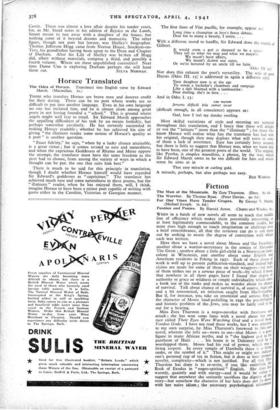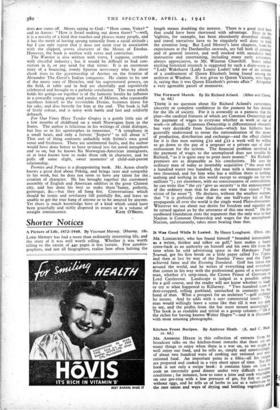Fiction
For Our Vines Have Tender Grapes. By George V. Martin. (Michael Joseph. 7s. 6d.)
Peonies and Ponies. By Harold Acton. ■Clatto and Windus. Is. WHEN in a batch of new novels all seem to reach that middle line of efficiency which makes them potentially interesting, or at least legitimately commendable, to the common reader, but none rises high enough to touch imagination or challenge even a brief remembrance, all that the reviewer can do is sort them out by seeking to assess the degree of conviction with which each was written.
Here then we have a novel about Moses and 'the Israelites: another about a warrior-mercenary in the armies of Alexander The Great ; another about a little girl-child in a Norwegian farm- colony in Wisconsin, and another about some English and American residents in Peking in 1937. Each of these pieces of work is well up to present publication-standard, and indeed high claims are made for some of them on their wrappers--z-yet non: of them strikes me as a serious piece of work—by which I mean that nowhere in all these pages have I found that degree of authority or grace or wildness or simple individuality which takes a book out of the ranks and makes us wonder about its chance of survival. Talk about chance of survival is, of course, high talk and a bit nonsensical, an infection caught from blurb-reading. But if, for instance, you take an emotional and serious fling Je the character of Moses loud-pedalling in 1941 the psycholgol and historic problem Of the-Jews, you may be fairly said to Iv out for a hearing. Miss Zora Thurston is a negro-novelist with freshness and attack ; she has won some fame with a novel about her no race called Their Eyes Were Watching God and a travel book., Voodoo Gods. I have not read these works, but I was attractee. to my own surprise, by Miss Thurston's foreword to this ne". novel, wherein she tells us—news to me—that Moses is a great figure in many African myths, and is " the highest god in 5 pantheon of Haiti . . . his home is in Dahomey and he worshipped there. Moses had his rod of power, which was a living serpent. In every temple of Damballa there is a livin?, snake, or the symbol of it." This might or might not indica.:-: one's personal cup of tea in fiction, but it does at least pron11.5: novelty, complexity—which is not justified. For all that Thurston has done is to re-write, if you like embellish, de Book of Exodus in " negro-spiritual " English. She does th.! warmly, quaintly and with energy—and it would be unfairtht:, suggest that anywhere she seriously sacrifices the dignity of story—but somehow the character of her hero does not lie °c" with her naive idiom ; the necessary psychological adjust°cli,
does not come off. Moses saying to God: " How come, Voice? " and to Aaron: "How is Israel making out down there? "—well, it is a novelty of a kind that touches and pleases many people, and it has the merit of having sprung naturally from a racial attitude ; but I can only repeat that it does not seem true in association with the clipped, severe character of the Moses of Exodus. However, the book is written with verve and conviction.
The Warrior is also written with verve, I suppose, certainly with cheerful industry ; but it would be difficult to find con- viction in it, or any need for that virtue. It is an enormous story of a bouncing; rowdy Spartan mercenary who by sheer cheek rises to the governorship of Aomus on the frontier of Alexander The.Great's Indian conquests. He claims to be one of the many sons of Heracles, and his supernatural powers, on the field, at table and in bed are cheerfully and repetitively celebrated and brought to a pathetic conclusion. The story which holds his goings-on together is of the fantastic loyalty he inflames in a cowardly young pimp and pandar of Miletos, who repeatedly sacrifices himself to the irresistible Daxias, becomes brave for his sake, and dies bravely for him at the end. The book is full of lively colour, and is noisy with battle and lust and soldierly debauch.
For Our Vines Have Tender Grapes is a gentle little tale of a few months of childhood on a small Norwegian farm in the States. The author is felicitous in his writings of child dialogue, but less so in his apostrophes to innocence. " A symphony in a small heart, and only a fervent 'leepers! ' to tell about it." That sort of thing contrasts unluckily with Selma's own good sense and freshness. There are sentimental faults, and the author would have done better to have strained iess for novel metaphors and so on, but he knows his Norwegian-American immigrants, or at least knows how to make them talk in character, and he pulls off some slight, sweet moments' of child-and-parent relationship.
Peonies and Ponies is a disappointing book. Mr. Acton clearly knows a great deal about Peking, and brings taste and sympathy to his work, but he does not seem to have any talent for the - creation of character. He has brought together the customary assembly of English and American oddities in the great Chinese city, and has done his best to make them 'funny, pathetic, grotesque, &c.—but they all hang fire. Conversations which should be ironic and revelatory fall painfully flat, and leave us unable to get the true hang of anyone or to be amused by anyone. Yet there is much knowledge here of a kind which could have been gracefully and richly disposed in essays or in a volume of
straight reminiscence. KATE O'BRIEN.



























 Previous page
Previous page